Bundaberg Hospital Case Study: Organizational Governance & Performance
VerifiedAdded on 2023/06/06
|5
|1305
|284
Case Study
AI Summary
This case study examines the corporate governance failures at Bundaberg Hospital, focusing on the Medical Board of Queensland's negligent registration of Dr. Patel and subsequent appointments without proper background checks. It highlights the lack of due diligence by key administrators like Dr. Nayman and Dr. Keating, who failed to assess Dr. Patel's qualifications and competence. The study proposes governance mechanisms to prevent such clinical failings, including oversight bodies for surgeon scrutiny, independent complaint systems, mandatory pre-operation assessments, and thorough verification of employee credentials. It emphasizes the importance of addressing employee shortages, fostering relationships with healthcare schools, and establishing effective communication channels to ensure patient safety and quality healthcare. The case underscores the need for strict penalties for negligence in admitting unqualified personnel and prioritizing patient well-being over budgetary constraints.
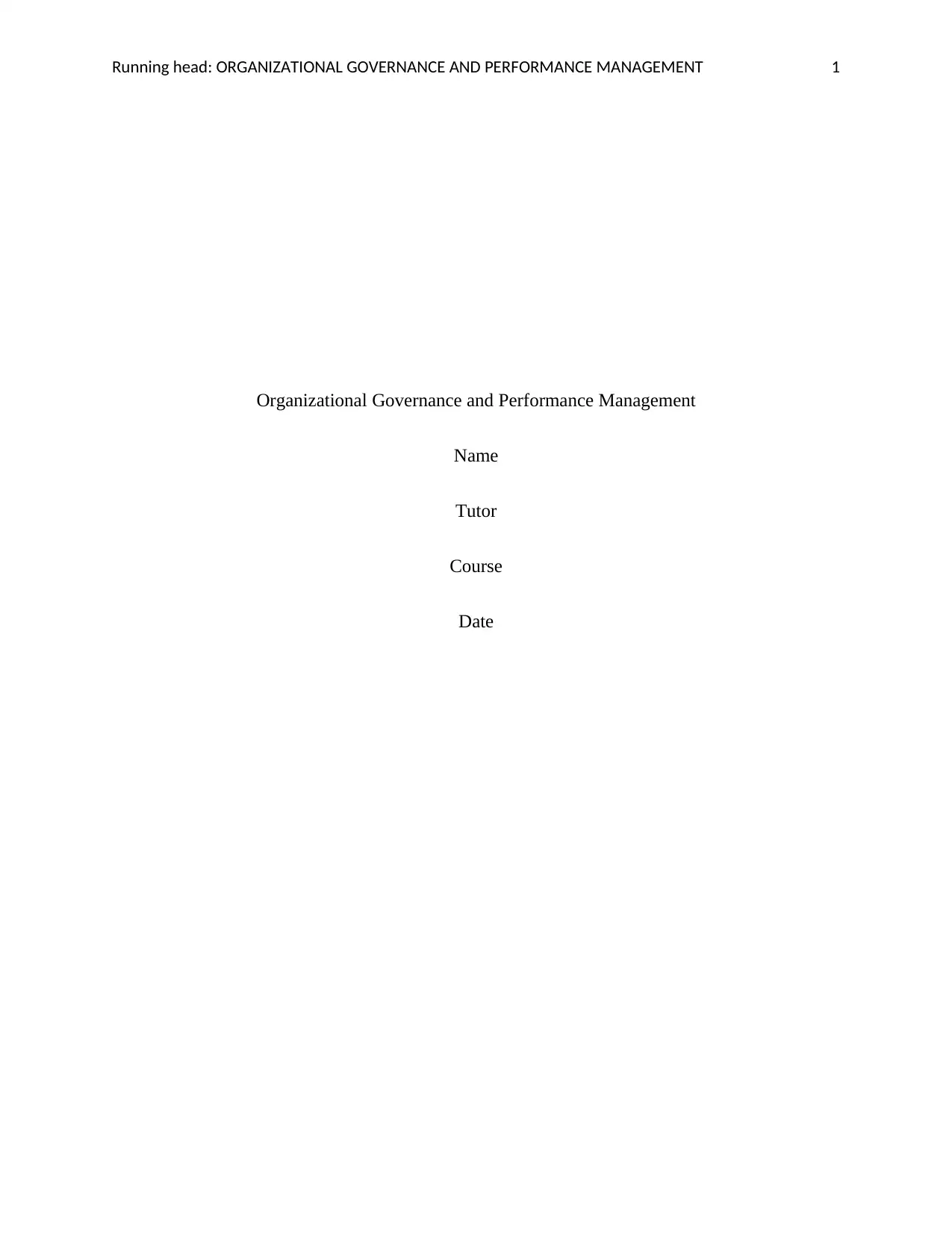
Running head: ORGANIZATIONAL GOVERNANCE AND PERFORMANCE MANAGEMENT 1
Organizational Governance and Performance Management
Name
Tutor
Course
Date
Organizational Governance and Performance Management
Name
Tutor
Course
Date
Paraphrase This Document
Need a fresh take? Get an instant paraphrase of this document with our AI Paraphraser
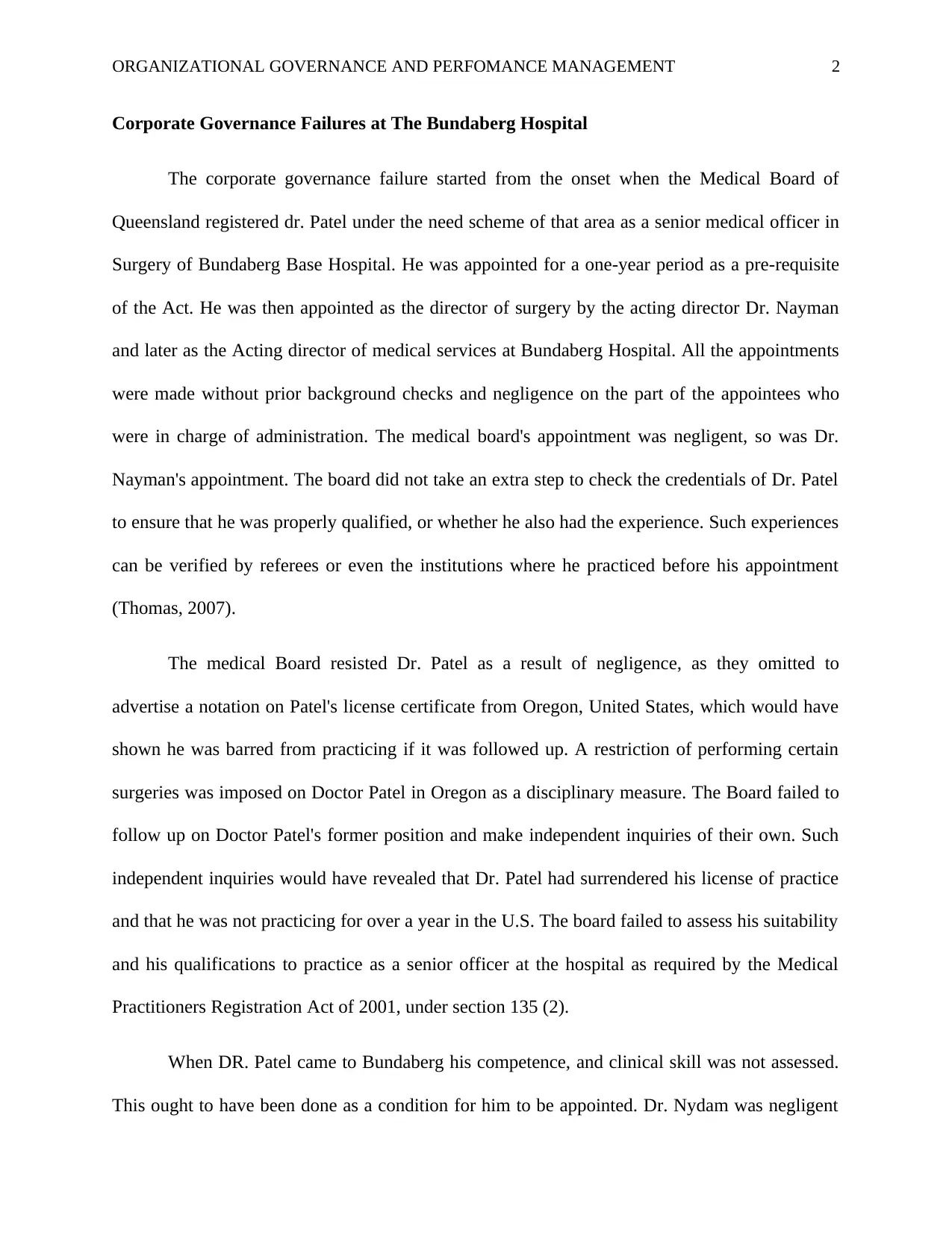
ORGANIZATIONAL GOVERNANCE AND PERFOMANCE MANAGEMENT 2
Corporate Governance Failures at The Bundaberg Hospital
The corporate governance failure started from the onset when the Medical Board of
Queensland registered dr. Patel under the need scheme of that area as a senior medical officer in
Surgery of Bundaberg Base Hospital. He was appointed for a one-year period as a pre-requisite
of the Act. He was then appointed as the director of surgery by the acting director Dr. Nayman
and later as the Acting director of medical services at Bundaberg Hospital. All the appointments
were made without prior background checks and negligence on the part of the appointees who
were in charge of administration. The medical board's appointment was negligent, so was Dr.
Nayman's appointment. The board did not take an extra step to check the credentials of Dr. Patel
to ensure that he was properly qualified, or whether he also had the experience. Such experiences
can be verified by referees or even the institutions where he practiced before his appointment
(Thomas, 2007).
The medical Board resisted Dr. Patel as a result of negligence, as they omitted to
advertise a notation on Patel's license certificate from Oregon, United States, which would have
shown he was barred from practicing if it was followed up. A restriction of performing certain
surgeries was imposed on Doctor Patel in Oregon as a disciplinary measure. The Board failed to
follow up on Doctor Patel's former position and make independent inquiries of their own. Such
independent inquiries would have revealed that Dr. Patel had surrendered his license of practice
and that he was not practicing for over a year in the U.S. The board failed to assess his suitability
and his qualifications to practice as a senior officer at the hospital as required by the Medical
Practitioners Registration Act of 2001, under section 135 (2).
When DR. Patel came to Bundaberg his competence, and clinical skill was not assessed.
This ought to have been done as a condition for him to be appointed. Dr. Nydam was negligent
Corporate Governance Failures at The Bundaberg Hospital
The corporate governance failure started from the onset when the Medical Board of
Queensland registered dr. Patel under the need scheme of that area as a senior medical officer in
Surgery of Bundaberg Base Hospital. He was appointed for a one-year period as a pre-requisite
of the Act. He was then appointed as the director of surgery by the acting director Dr. Nayman
and later as the Acting director of medical services at Bundaberg Hospital. All the appointments
were made without prior background checks and negligence on the part of the appointees who
were in charge of administration. The medical board's appointment was negligent, so was Dr.
Nayman's appointment. The board did not take an extra step to check the credentials of Dr. Patel
to ensure that he was properly qualified, or whether he also had the experience. Such experiences
can be verified by referees or even the institutions where he practiced before his appointment
(Thomas, 2007).
The medical Board resisted Dr. Patel as a result of negligence, as they omitted to
advertise a notation on Patel's license certificate from Oregon, United States, which would have
shown he was barred from practicing if it was followed up. A restriction of performing certain
surgeries was imposed on Doctor Patel in Oregon as a disciplinary measure. The Board failed to
follow up on Doctor Patel's former position and make independent inquiries of their own. Such
independent inquiries would have revealed that Dr. Patel had surrendered his license of practice
and that he was not practicing for over a year in the U.S. The board failed to assess his suitability
and his qualifications to practice as a senior officer at the hospital as required by the Medical
Practitioners Registration Act of 2001, under section 135 (2).
When DR. Patel came to Bundaberg his competence, and clinical skill was not assessed.
This ought to have been done as a condition for him to be appointed. Dr. Nydam was negligent
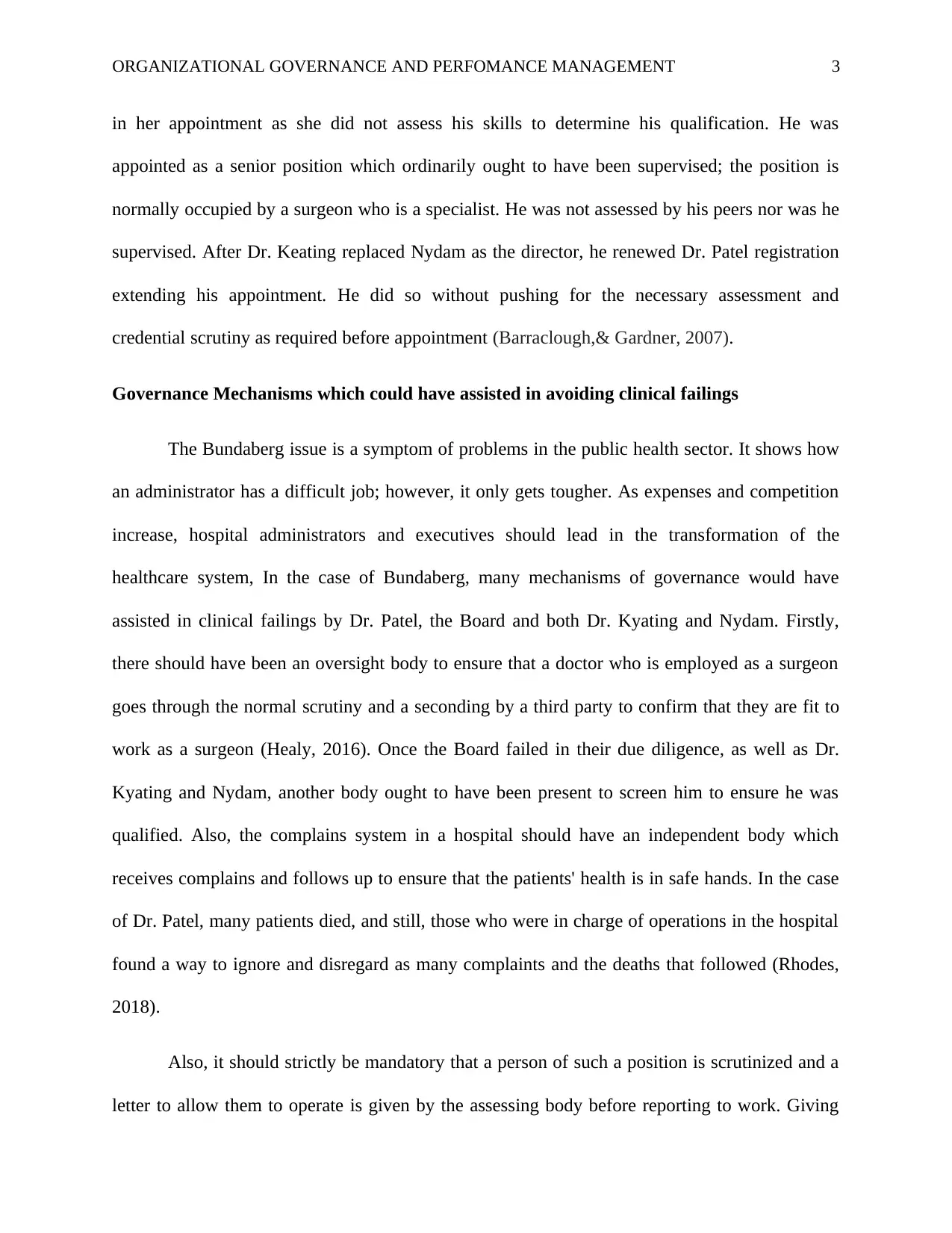
ORGANIZATIONAL GOVERNANCE AND PERFOMANCE MANAGEMENT 3
in her appointment as she did not assess his skills to determine his qualification. He was
appointed as a senior position which ordinarily ought to have been supervised; the position is
normally occupied by a surgeon who is a specialist. He was not assessed by his peers nor was he
supervised. After Dr. Keating replaced Nydam as the director, he renewed Dr. Patel registration
extending his appointment. He did so without pushing for the necessary assessment and
credential scrutiny as required before appointment (Barraclough,& Gardner, 2007).
Governance Mechanisms which could have assisted in avoiding clinical failings
The Bundaberg issue is a symptom of problems in the public health sector. It shows how
an administrator has a difficult job; however, it only gets tougher. As expenses and competition
increase, hospital administrators and executives should lead in the transformation of the
healthcare system, In the case of Bundaberg, many mechanisms of governance would have
assisted in clinical failings by Dr. Patel, the Board and both Dr. Kyating and Nydam. Firstly,
there should have been an oversight body to ensure that a doctor who is employed as a surgeon
goes through the normal scrutiny and a seconding by a third party to confirm that they are fit to
work as a surgeon (Healy, 2016). Once the Board failed in their due diligence, as well as Dr.
Kyating and Nydam, another body ought to have been present to screen him to ensure he was
qualified. Also, the complains system in a hospital should have an independent body which
receives complains and follows up to ensure that the patients' health is in safe hands. In the case
of Dr. Patel, many patients died, and still, those who were in charge of operations in the hospital
found a way to ignore and disregard as many complaints and the deaths that followed (Rhodes,
2018).
Also, it should strictly be mandatory that a person of such a position is scrutinized and a
letter to allow them to operate is given by the assessing body before reporting to work. Giving
in her appointment as she did not assess his skills to determine his qualification. He was
appointed as a senior position which ordinarily ought to have been supervised; the position is
normally occupied by a surgeon who is a specialist. He was not assessed by his peers nor was he
supervised. After Dr. Keating replaced Nydam as the director, he renewed Dr. Patel registration
extending his appointment. He did so without pushing for the necessary assessment and
credential scrutiny as required before appointment (Barraclough,& Gardner, 2007).
Governance Mechanisms which could have assisted in avoiding clinical failings
The Bundaberg issue is a symptom of problems in the public health sector. It shows how
an administrator has a difficult job; however, it only gets tougher. As expenses and competition
increase, hospital administrators and executives should lead in the transformation of the
healthcare system, In the case of Bundaberg, many mechanisms of governance would have
assisted in clinical failings by Dr. Patel, the Board and both Dr. Kyating and Nydam. Firstly,
there should have been an oversight body to ensure that a doctor who is employed as a surgeon
goes through the normal scrutiny and a seconding by a third party to confirm that they are fit to
work as a surgeon (Healy, 2016). Once the Board failed in their due diligence, as well as Dr.
Kyating and Nydam, another body ought to have been present to screen him to ensure he was
qualified. Also, the complains system in a hospital should have an independent body which
receives complains and follows up to ensure that the patients' health is in safe hands. In the case
of Dr. Patel, many patients died, and still, those who were in charge of operations in the hospital
found a way to ignore and disregard as many complaints and the deaths that followed (Rhodes,
2018).
Also, it should strictly be mandatory that a person of such a position is scrutinized and a
letter to allow them to operate is given by the assessing body before reporting to work. Giving
⊘ This is a preview!⊘
Do you want full access?
Subscribe today to unlock all pages.

Trusted by 1+ million students worldwide
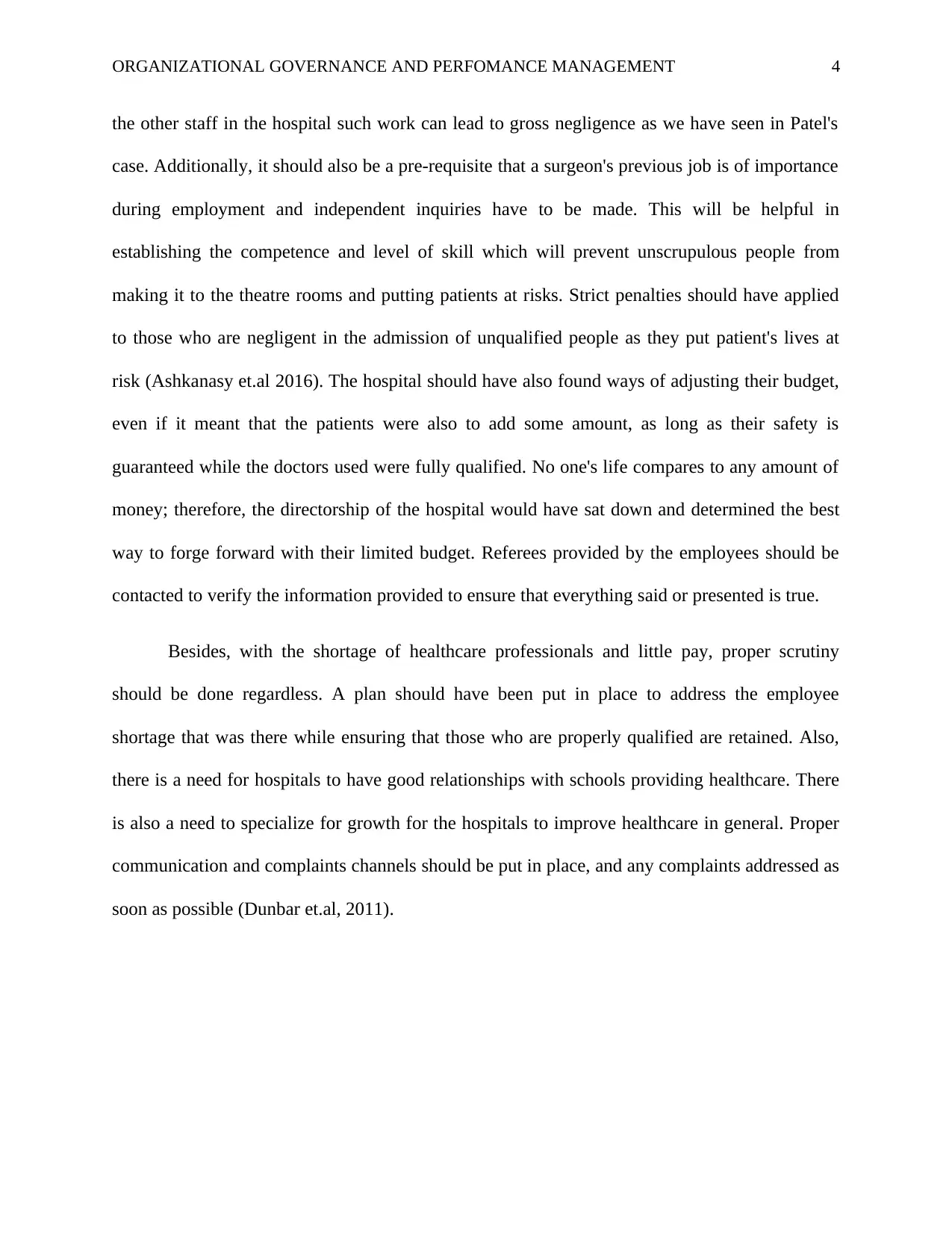
ORGANIZATIONAL GOVERNANCE AND PERFOMANCE MANAGEMENT 4
the other staff in the hospital such work can lead to gross negligence as we have seen in Patel's
case. Additionally, it should also be a pre-requisite that a surgeon's previous job is of importance
during employment and independent inquiries have to be made. This will be helpful in
establishing the competence and level of skill which will prevent unscrupulous people from
making it to the theatre rooms and putting patients at risks. Strict penalties should have applied
to those who are negligent in the admission of unqualified people as they put patient's lives at
risk (Ashkanasy et.al 2016). The hospital should have also found ways of adjusting their budget,
even if it meant that the patients were also to add some amount, as long as their safety is
guaranteed while the doctors used were fully qualified. No one's life compares to any amount of
money; therefore, the directorship of the hospital would have sat down and determined the best
way to forge forward with their limited budget. Referees provided by the employees should be
contacted to verify the information provided to ensure that everything said or presented is true.
Besides, with the shortage of healthcare professionals and little pay, proper scrutiny
should be done regardless. A plan should have been put in place to address the employee
shortage that was there while ensuring that those who are properly qualified are retained. Also,
there is a need for hospitals to have good relationships with schools providing healthcare. There
is also a need to specialize for growth for the hospitals to improve healthcare in general. Proper
communication and complaints channels should be put in place, and any complaints addressed as
soon as possible (Dunbar et.al, 2011).
the other staff in the hospital such work can lead to gross negligence as we have seen in Patel's
case. Additionally, it should also be a pre-requisite that a surgeon's previous job is of importance
during employment and independent inquiries have to be made. This will be helpful in
establishing the competence and level of skill which will prevent unscrupulous people from
making it to the theatre rooms and putting patients at risks. Strict penalties should have applied
to those who are negligent in the admission of unqualified people as they put patient's lives at
risk (Ashkanasy et.al 2016). The hospital should have also found ways of adjusting their budget,
even if it meant that the patients were also to add some amount, as long as their safety is
guaranteed while the doctors used were fully qualified. No one's life compares to any amount of
money; therefore, the directorship of the hospital would have sat down and determined the best
way to forge forward with their limited budget. Referees provided by the employees should be
contacted to verify the information provided to ensure that everything said or presented is true.
Besides, with the shortage of healthcare professionals and little pay, proper scrutiny
should be done regardless. A plan should have been put in place to address the employee
shortage that was there while ensuring that those who are properly qualified are retained. Also,
there is a need for hospitals to have good relationships with schools providing healthcare. There
is also a need to specialize for growth for the hospitals to improve healthcare in general. Proper
communication and complaints channels should be put in place, and any complaints addressed as
soon as possible (Dunbar et.al, 2011).
Paraphrase This Document
Need a fresh take? Get an instant paraphrase of this document with our AI Paraphraser
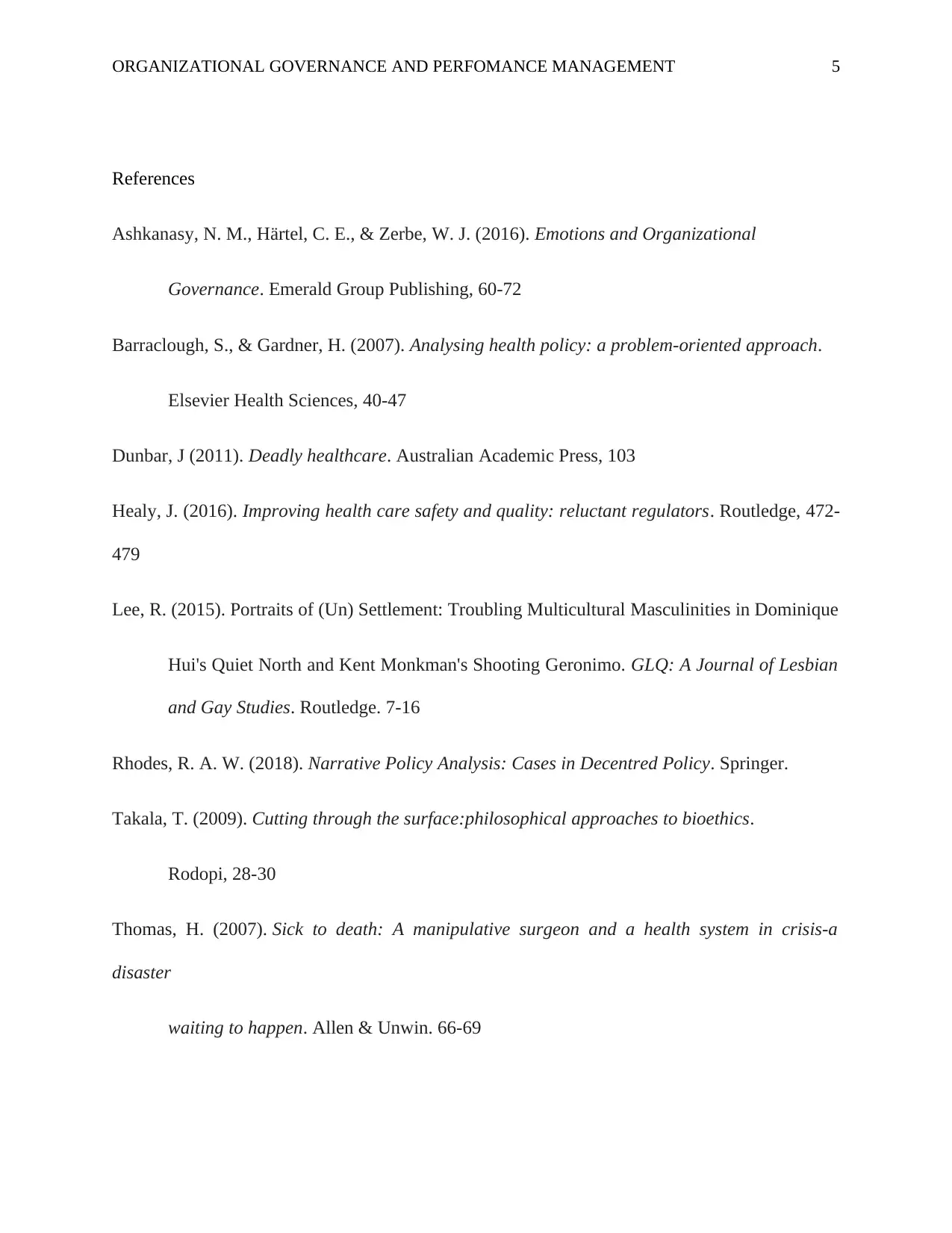
ORGANIZATIONAL GOVERNANCE AND PERFOMANCE MANAGEMENT 5
References
Ashkanasy, N. M., Härtel, C. E., & Zerbe, W. J. (2016). Emotions and Organizational
Governance. Emerald Group Publishing, 60-72
Barraclough, S., & Gardner, H. (2007). Analysing health policy: a problem-oriented approach.
Elsevier Health Sciences, 40-47
Dunbar, J (2011). Deadly healthcare. Australian Academic Press, 103
Healy, J. (2016). Improving health care safety and quality: reluctant regulators. Routledge, 472-
479
Lee, R. (2015). Portraits of (Un) Settlement: Troubling Multicultural Masculinities in Dominique
Hui's Quiet North and Kent Monkman's Shooting Geronimo. GLQ: A Journal of Lesbian
and Gay Studies. Routledge. 7-16
Rhodes, R. A. W. (2018). Narrative Policy Analysis: Cases in Decentred Policy. Springer.
Takala, T. (2009). Cutting through the surface:philosophical approaches to bioethics.
Rodopi, 28-30
Thomas, H. (2007). Sick to death: A manipulative surgeon and a health system in crisis-a
disaster
waiting to happen. Allen & Unwin. 66-69
References
Ashkanasy, N. M., Härtel, C. E., & Zerbe, W. J. (2016). Emotions and Organizational
Governance. Emerald Group Publishing, 60-72
Barraclough, S., & Gardner, H. (2007). Analysing health policy: a problem-oriented approach.
Elsevier Health Sciences, 40-47
Dunbar, J (2011). Deadly healthcare. Australian Academic Press, 103
Healy, J. (2016). Improving health care safety and quality: reluctant regulators. Routledge, 472-
479
Lee, R. (2015). Portraits of (Un) Settlement: Troubling Multicultural Masculinities in Dominique
Hui's Quiet North and Kent Monkman's Shooting Geronimo. GLQ: A Journal of Lesbian
and Gay Studies. Routledge. 7-16
Rhodes, R. A. W. (2018). Narrative Policy Analysis: Cases in Decentred Policy. Springer.
Takala, T. (2009). Cutting through the surface:philosophical approaches to bioethics.
Rodopi, 28-30
Thomas, H. (2007). Sick to death: A manipulative surgeon and a health system in crisis-a
disaster
waiting to happen. Allen & Unwin. 66-69
1 out of 5
Related Documents
Your All-in-One AI-Powered Toolkit for Academic Success.
+13062052269
info@desklib.com
Available 24*7 on WhatsApp / Email
![[object Object]](/_next/static/media/star-bottom.7253800d.svg)
Unlock your academic potential
Copyright © 2020–2025 A2Z Services. All Rights Reserved. Developed and managed by ZUCOL.





